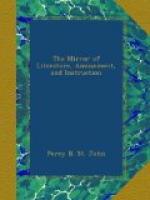When the news of this catastrophe reached the younger Spenser, he was at the head of a fine army, which had sat down before the city of Hereford, for the purpose of reducing it to obedience to king Edward. The formidable force which he commanded had struck terror into the hearts of the citizens, so that notwithstanding their attachment to queen Isabella, and their detestation of Spenser, they had shown symptoms of their willingness to yield to the latter upon reasonable terms; and he, desirous of obtaining possession of the city without any unnecessary effusion of blood, had granted a truce of a week’s duration, to give them time to decide upon what conditions they would open their gates to him. The disastrous intelligence which he received from Bristol, however, made him doubtful whether he should hold inviolate the truce which he had granted to the besieged. He did not doubt but that the Earl of Kent and his troops, flushed with conquest, would hasten to his destruction, and to the relief of Hereford, and that unless he could possess himself of the city and castle, and by shutting himself up in the latter be enabled to bid defiance to his enemies, the fate of his father must inevitably be his own.
The favourite recreation of the inhabitants of Hereford was then, as it is now, to make excursions either alone, or in parties, upon their beautiful river. This amusement had become so much a custom with them, that the most timid females were not afraid to venture alone and at night in a small skiff, with which almost every family of respectability was provided; and on a bright moonlight night, the bosom of the river was beautifully diversified by the white sails glittering in the moonbeams, while sweet female voices would be heard warbling some popular melodies, the, subjects of which were usually the praises of prince Edward, or execrations of Spenser and those who had corrupted the king. It was on such a night, that the incident with which our narrative commences occurred. The moon was riding in an unclouded sky—unclouded except by those light fleecy vapours which hovered round the form of the queen of night, increasing rather than diminishing her beauty. The river seemed one sheet of silver, and numerous little vessels passing and repassing, gave it a delightfully animated appearance. In one, which seemed to be venturing nearer to the camp of the enemy than the others, might be seen a light and delicate female form, and on the shore which she was approaching, a little above the village of Northbrigg, stood a soldier, whose accoutrements bespoke him to belong to the army of Sir Hugh Spenser.
The lady landed, and the soldier hastened to meet her. “Dearest Isabel,” he said, “blessings upon thy generous trusting heart, for this sweet meeting! I have much to tell thee, but that my tongue dares not utter all with which my mind is stored; and if it dared, it is not on such a night as this, so bright, so beautiful, that tidings dark as mine should be communicated.” Isabel, who had laid her head upon his breast when they met, started from him, and gazed with the utmost terror and surprise at the unwonted gloom which darkened his countenance.




